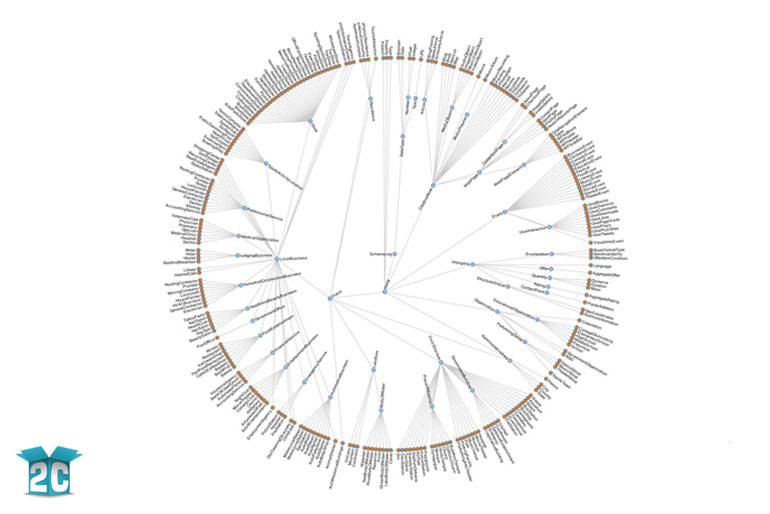
Who: The Joint Initiative
Schema.org is a joint initiative of the major search engines Google, Bing, Yahoo and Yandex aimed at making it easier to index web pages in a way that facilitates the building of sophisticated search services through structured data and allows search engines to more efficiently crawl the information on your site.
What: Structured Data (Rich Snippets) vs Unstructured Data (Big Data)
Structured Data is data (about your company and products) that resides in fixed fields within a record or file. Structured data is added directly to a page’s HTML markup by a webmaster.
Search engines use that structured data to generate rich snippets, which are small pieces of information that will then appear in search results, as well as other interesting applications like Dun & Bradstreet® or Manta.com. We are all familiar with Googling our own company name and seeing other websites listing facts about our company.
There is also unstructured data, a part of the new idea called Big Data, which can be analyzed by using data tools. Read more about big data here.
Why: Searchers save time, and make better decisions.
Snippets—the few lines of text that appear under every search result—are designed to give users a sense for what’s on the page and why it’s relevant to their query. It can keep you from having to crawl in and out multiples websites wasting time trying to get basic information about how to contact a company, or about their products or events.
What if you could see that all from a simple Google search?
Where: Structured Data that become Rich Snippets on the SERPs
- Reviews
- People
- Products
- Businesses and organizations
- Recipes
- Events
- Music




Why Should You Care?
Over time, even more bits of data than Google is currently displaying will start to show up in the SERPs. Google doesn’t announce these things, they just test it, adjust it, then roll it out.
Anytime, you can offer more data about your organization, events, and products, the better exposure you have for your company!
Basically this is FREE upgraded advertising on Google!
- Who doesn’t want free?
- Who doesn’t want to offer an improved brand experience?
- Who doesn’t want to beat out the competition?
More than 36% of Google’s SERPs incorporate Schema!
Have you noticed that the search engine listings for the following sites are full of inciting information: Barnes and Noble, Café Press, eBay, Facebook, Green Peace, Trivago, Weather.com, Yelp, You Tube? Early adopters of this technology were very large organizations and social media platforms who immediately saw the benefit of their search engine listings standing out above the rest, while offering more incentive to click through and to purchase.
According to a study on searchengineland.com, by Matt McGee, in April 2014, “more than one-third (36%) of Google’s search results incorporate Schema.org rich snippets.” Mobile search relies heavily on this structured data, as does Google’s Hummingbird Update (August 2013), where Google started rewarding conversational content, schema, social links, online citation.
Schema has become a touchstone of internet marketing. Website owners who are serious about competing in their industry should strongly consider having their webmaster add schema.org markup to their website now. Besides making your company visible to mobile users, this can also give you a competitive edge in desktop search results. See our case study below.
“Sites using Schema ranked four positions better…”
When Searchmetrics did their study, they found that “sites using Schema ranked on average four positions better than those without…” Now, they were careful to note that this study is new, and the findings could also mean that webmasters that use Schema.org are one step ahead of the competition due to other factors that affect their rankings in a positive way, as well. For example, those sites might also devote more resources to creating content, tending to social media, and to SEO. But we do know that Google’s Hummingbird Update in August 2013 rewards conversational content, schema, social links, online citation.
eCommerce Websites without Schema Markup are loosing out!
What if all the critical product information you want customers to know, could be seen on Google, rather than having to click in and out of websites to gather all that information? Let’s say your product price is the lowest, and customers can see that right on Google?
- What if you offer a killer shopping deal and they can see that?
- What if other companies are out of stock, and you happen to have all the stock of a certain product?
- Do you think that will push sales? Of course!
According to the Searchmetrics study, April 2014, one of the most common schema integrations was for sites that sell products, where schema markup offers important search and pre-purchase information to searchers, on both desktop and mobile search. It shortens the process for shoppers by allowing them to see critical product information without having to click through to each site.
Schema Case Study
“When we first heard about schema.org markup for e-commerce sites, it had just been introduced and we weren’t sure how much of a benefit it would be for our business. When we began seeing SERPs with product pricing and availability included, we knew it was time to find a way to implement it. 2C Development Group did the markup for our product pages. Within a few short weeks, we saw the results. Our products now stand out from many of our competitors in the search engines. So glad we took the plunge! It has definitely helped sales.”
Pat Pepe, West Florida Components
Before Markup – No Rich Snippets
After Markup – Rich Snippets
In Conclusion
Schema has become somewhat ubiquitous on sites built in content management systems (CMS), that include schema markup by default, such as WordPress, Drupal, and some eCommerce shopping carts. However, we still see older sites that are not using schema, and they are losing out.




